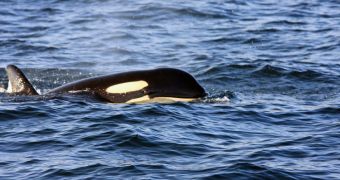Antarctica is the home of numerous whale species, which agglomerate in its waters to conduct rituals, or simply to hang out, as some researchers have put it. But now, a distinct and unique subgroup of killer whales is being endangered by human activities and especially by fishing. These large creatures are in the habit of feeding on Antarctic tootfish, which is more commonly known as Chilean Sea Bass. Fishing ships navigating the Southern Ocean appear to be draining the fish reserves dry, thus endangering the whales, a new investigation has learned.
Researchers don't yet know what is happening to the animals. Some believe that they are simply dying of famine, while others argue that they have departed these unfriendly waters. The truth could be somewhere in the middle, but one thing is certain. The groups that used to inhabit the water around the Ross Ice Shelf – an ice tip the size of France – are constantly shrinking. The animals “hanging out” there are called Ross Sea killer whales, or ecotype-C orca whales. They can only be found at this location, and some scientists even believe that they may be an entirely different species than other orcas. They have a tendency to accumulate in very large groups, or at least they did in the past.
“There’s been a dramatic disappearance of the whales. We think they’re having a harder time trying to find food. Whether that leads to population decrease, hopefully we won’t find out. But we will find out, if it continues,” says David Ainley, who is a biologist and an expert at H.T. Harvey and Associates ecological consulting firm. He is also the coauthor of a new study detailing the discovery, which appears in the March issue of the respected scientific journal Aquatic Mammals.
The only threat to these beautiful creatures is the insatiable human appetite for tasty, easy-to-cook fish. Not three decades ago, people discovered that the Patagonian toothfish was a very tasty treat, and as such fishing fleets decimated its population. Now, once they finished exploiting these reserves, they have moved to the Antarctic, searching for the Patagonian tootfish's closest relative, the Antarctic one. This has caused a sharp decline in whale numbers. Ross Sea killer whale sightings have decreased by 66 percent within the last five years, and no new large groups have been identified at their old “convention center.”
“We don’t know for sure what this means. But we do know that they eat the toothfish, and we know that the toothfish industry has taken off in the last 10 years,” explains Point Reyes Bird Observatory biologist Grant Ballard, who is also a coauthor of the new investigation. “We’re talking about the last pristine ecosystem. It’s important to have one of them left. Going forward, people won’t have reference points to what we used to have. We’ll get used to a more and more degraded Earth. And I think we’re running into that here. It’s the last stand,” he concludes, quoted by Wired.

 14 DAY TRIAL //
14 DAY TRIAL //